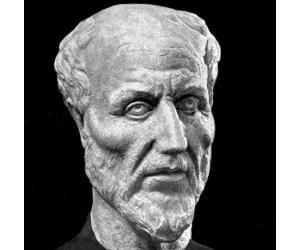2nd installment :Plotinus
by: Karol Saleh
section 8


Childhood &
Early Life
1. Just like most of the ancient philosophers
not too much is known about Plotinus’ life but because one of his
disciples Porphyry had written a biography on him, therefore we know more about
him than any other ancient philosopher.
2. Plotinus was
born in Lycopolis, Egypt, in 204 or 205 C.E. Towards his late 20's, he moved to
Alexandria to learn more about philosophy. He was not happy with any teacher’s
teachings until he met Ammonius Saccas.
3. He started
studying under his newly found teacher and was also influenced by the
philosophical works of Alexander of Aphrodisias, Numenius and various Stoics.
Life & Work
1. Around the age of 38, after studying intently in Alexandria for
about eleven years, Plotinus decided to take his philosophical curiosity to the
Persian philosophers and Indian philosophers.
· 2.For his new pursuit, he joined the army of Gordian III, which
was assigned to capture Persia but unfortunately they failed and after
Gordian’s death Plotinus had to leave the place, which is why he fled to
Antioch.
· 3. By the age of 40, under Philip of Arab’s sovereignty, Plotinus
came to Rome and built up a circle of students, which included: Porphyry,
Amelius Gentilianus of Tuscany, the Senator Castricius Firmus, Eustochius of
Alexandria, Zoticus, a critic and poet, etc.
· 4. He also had students amongst the Roman Senate, like, Marcellus
Orontius, Sabinillus, etc. He also had female students and lived in the house of
one of his woman disciples named Gemina. He was a correspondent of philosopher
Cassius Longinus.
· 5. In Rome, he became famous amongst the royal family as well; he
gained the admiration of the Emperor Gallienus and his wife Salonina. He also
endeavored rebuilding an abandoned settlement in Campania and called it ‘City
of Philosophers’.
· 6. He spent his final days in isolation on his friend Zethos’
property in Campania. Eustochius attended him at the end and Plotinus' final
words were, "Strive to give back the Divine in yourselves to the Divine in
the All."
· 7. Plotinus was 66 years old when he died in 270 C.E., the second
year of the reign of the emperor Claudius II.
· 8. Plotinus’ essays became ‘Enneads’ about 17 years after his
death. Porphyry compiled and arranged his notes himself and
before that they were just a huge collection of notes and essays that Plotinus
used to use for his lectures